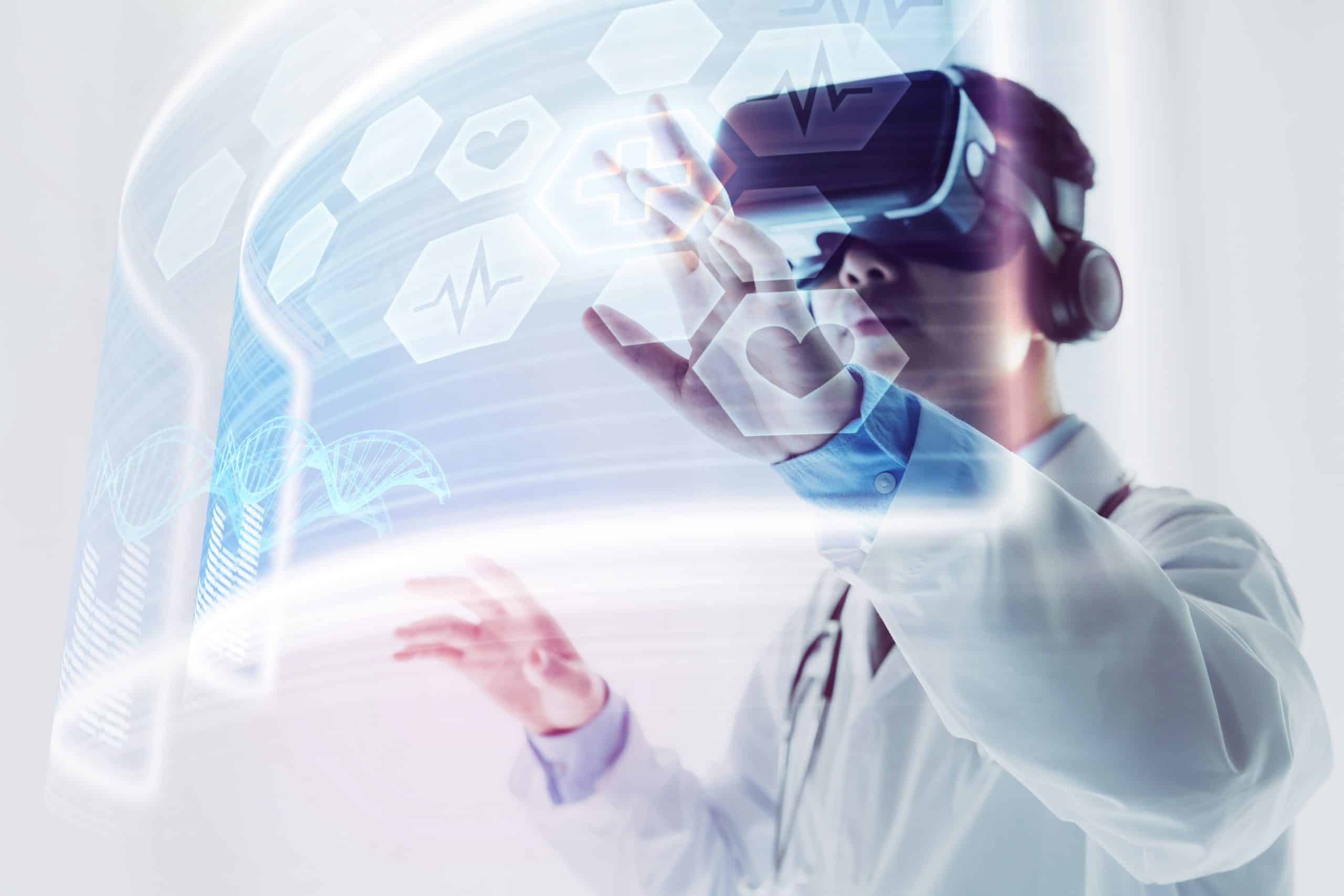Considered the Nobel Prize for biopharmaceutical research, the Prix Galien honors medical excellence and innovation that could significantly improve the health of patients and the work of health professionals. All health sectors are represented (pharmaceuticals, medical devices, digital health, etc.) across six categories: Biotech, Pharma, Medical Technology, Digital Health, Incubators and Start-ups. For Frédéric Rossi, CEO of Business France for North America, this prize represents a “great opportunity for French companies to present exciting projects and meet US leaders in the health sector to encourage the rapid adoption of essential innovations.” The six competing French medical technology companies are well aware of this.
– Dessintey accelerates post-stroke rehabilitation using “digital” mirror therapy
Founded in 2017, Dessintey has designed two robotic devices that help stroke patients recover use of paralyzed limbs by giving them the illusion that their injured limbs are still functioning.
A screen, linked to a camera and some software, shows the patient an image of their paralyzed limb in movement, or rather the illusion that their limb is moving. “Patients focus on this visualization and proactively participate in the process. They try to move their paralyzed limb. The device shows them a positive image, which promotes brain plasticity through learning. It creates a virtuous circle!” enthuses Nicolas Fournier, Chairman of Dessintey.
Dessintey launched its first product for upper limbs, the IVS3, in mid-2018. It has just launched its second device, the IVS4, for lower limbs, in September 2022. These rehabilitation devices dedicated to the control and planning of movement make demands on the injured hemisphere of the brain, the area affected by the stroke. Patients are on average treated for between 4 and 6 weeks, with one or two 20-minute sessions a day. They also have access to a database of 800 varied and customized exercises. Today, more than 100 hospitals in France use these solutions. The products are distributed in around fifteen countries in Europe.
– EpiLab, the first portable and rapid test for tuberculosis
3 in 10 million people who contract tuberculosis every year worldwide are not screened. This disease is the main cause of infectious mortality worldwide, with 1.5 million people dying of it every year. Eighty percent of contagions occur in developing countries, which are often under-equipped to deal with them. The EpiLab test does not need to be performed by medical staff. Reliable and available at an accessible price, it makes active case-finding campaigns in isolated areas possible. The results are communicated in less than two hours and are sent on a cloud network that ensures cases can be traced, in view of the patient’s care.
EpiLab embeds the patented technology EDMYC (Electrochemical Detection of MYCobacteria) at the intersection between microbiology and analytic electrochemistry. It rapidly confirms whether mycobacteria are present or not in a respiratory sample through an enzymatic reaction coupled with electrochemical detection.
EpiLab was created during lockdown, in March 2020. In February 2022, the startup conducted an initial €1 million financing to finish development of its portable kit. The first assessments in the field will be conducted in Togo and Benin in West Africa, two countries that have shown interest in this technology.
“What drives us at EpiLab is helping health organizations and governments fight tuberculosis by making screening accessible to all populations with limited access to health infrastructure. This doesn’t just concern developing countries but Western countries as well, where sites of tuberculosis infection are cropping up again, for example in prisons or migrant reception centers,” explains Maurice Lubetzki, CEO of EpiLAB.
– I.Ceram, a specialist in innovative biocompatible antibiotic-loaded ceramic implants
I.Ceram has been nominated for the Prix Galien for its new bioceramic antibiotic-loaded implant, “SB-SPIC1 sternal bar”. It helps stabilize the sternum for patients with comorbidities (diabetes, hypertension, etc.) that have to undergo rapid revision surgery after open heart surgery (coronary bypass, valve surgery, heart transplant, etc.). This implant aims to reduce the risk of bone destruction in the sternum and infection of the sternal part during cardiac surgery.
Created in 2006 in Limoges, I.Ceram designs, manufactures, and markets innovative orthopedic implants (14 international patents) and biocompatible ceramic implants. It is behind two world firsts in 2015 (implant of a ceramic sternum in the case of a tumor of the sternum) and 2016 (implant of an antibiotic-loaded ceramic sternum in chronic osteomyelitis). Its sternum implant is patented in the United States. The company uses alumina ceramics that could, in its view, constitute a potential breakthrough innovation to develop revolutionary treatments for bone infections and bone metastases. In early October 2022, I.Ceram was selected by BPI France during the 9th wave of its i-Nov competition, a competition dedicated to innovation. It has obtained financing of more than €800,000 to develop its project named S2OP2CI (Stabilisateur Sternal Osseux pour Patients à Comorbidités Infectieuses – Sternum Bone Stabilizer for Patients with Infectious Comorbidities) to stabilize the sternum during an initial sternotomy for heart surgery.
– Quantum Surgical, a robot for assisting liver cancer surgery
Responsible for 830,000 deaths in 2020, liver cancer is the third most deadly cancer in the world. Created in 2017 by Montpellier resident Bertin Nahum, Quantum Surgical has designed the robot Epione to help doctors plan, guide, and evaluate percutaneous ablation of tumors in the abdomen, a technique that consists of inserting a needle through the skin into the tumor to destroy it. The arms of the robot target the tumor with great precision for safer and more effective operations. “Epione is to date the only robotic platform capable of assisting practitioners on programming, targeting and carrying out percutaneous ablation interventions on cancerous tumors, particularly those located in the abdomen,” states Bertin Nahum. “Quantum Surgical thus offers a new approach to cancer treatment, enabling patients to benefit from innovative, better targeted, and less aggressive treatments.” The robot has been used since January 2022 by teams from the Institut Gustave-Roussy, a leading European cancer center.
On 4 June 2020, Professor Boris Guiu of Montpellier University Hospital successfully conducted the first thermo-ablation of a cancerous tumor assisted by the Epione robot. This surgical intervention was part of the multicenter clinical study conducted on 21 patients at the Institut Gustave-Roussy and at Montpellier University Hospital. The results published in February 2021 helped Quantum Surgical to obtain the CE marking in the same year.
In October 2021, the company received €15 million from the European Investment Bank as part of a financing agreement to accelerate Epione’s clinical adoption. This financing is part of an overall €40 million round of fund raising conducted by Ally Bridge Group (ABG).
– Remedee Labs, an anti-pain bracelet that releases endorphins
The Remedee bracelet is the first device that uses millimeter waves (60 gHz) to stimulate nerve endings in the wrist with great precision (0.5 mm within the skin). In response to this painless nerve stimulation, the brain releases intracerebral endorphins, the body’s natural painkiller. Regular (at least three times a day) and prolonged use means patients can benefit from endorphins’ natural soothing effects in order to improve quality of life in the long term. It is a solid alternative to analgesics and opiates.
In addition to the bracelet, there is a dedicated application for accessing regular reports and having discussions with coaches or the community of users, among other things. The company also offers a support service via an adapted and tailored care program. The coaches can also offer users modules that they can take, developed by neuropsychologists, nutritionists, and sport coaches.
The company is supported by Future4care, a digital health start-up accelerator, nominated for the Prix Galien in the Incubators and Accelerators category.
Founded in 2016, Remedee is currently conducting several clinical studies with university hospitals on fibromyalgia, as well as arthrosis, surgical pain, and migraines. In June 2022, the FDA recognized that Remedee’s bracelet is an innovative device, a key step in the company directors’ aspiration to market the product on US soil by 2024.
– Robeauté, microrobots “smaller than a grain of rice”
The Robeauté microrobot aims to help neurosurgeons get to hard-to-reach areas of the body, particularly in the brain. This medical device, less than a millimeter in size, delivers local and micro-invasive therapies in the brain, with unprecedented 3D motility and real-time connectivity.
Robeauté is thus taking part in a major technological revolution: moving from robotic surgery to microrobotic surgery, with greater precision, better results, and new audacious therapies to fight against global diseases that affect more than a billion people worldwide. “Our microrobot will light a spark among medical and scientific practitioners worldwide, allowing them to imagine and create more effective treatments, to be delivered locally,” states Bertrand Duplat, CEO and co-founder. With a propulsion and tracking system, the robot is made up of two parts. One moves in liquid areas and the other in solid areas of the brain. “The robot moves in a very precise way, following trajectories that are often very complex, towards pathological target locations, to be able to take measurements there and intervene there: deposit medication, micro-implants, or micro-electrodes, etc. based on the therapies for which it is used,” explains the CEO. Founded in 2017, the company is based in Paris.







